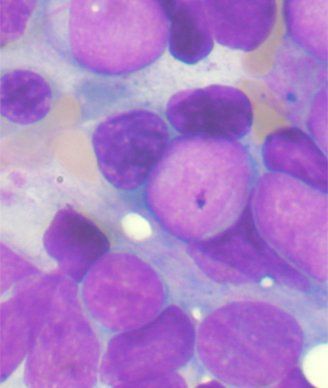Sorafenib Effective in Younger Patients with AML
Sorafenib proved to have a high level of efficacy in younger acute myeloid leukemia patients, improving both event- and relapse-free survival over placebo.
Bone marrow aspirate showing AML; source: Tontoni, Wikimedia Commons

SAN FRANCISCO-Sorafenib proved to have a high level of efficacy in younger patients with acute myeloid leukemia (AML) improving both event-free and relapse-free survival compared with placebo, according to data from the randomized SORAML trial presented here at the 2014 American Society of Hematology (ASH) Meeting & Exhibition.
“These data constitute the first randomized evidence that kinase inhibitors work in AML,” said study presenter Christoph Röllig, MD, of University Hospital Dresden, Germany.
In the study, Röllig and colleagues enrolled 276 patients aged 18 to 60 years between 2009 and 2011. All patients underwent 2 cycles induction therapy with daunorubicin/cytarabine, followed by 3 cycles of high-dose cytarabine consolidation therapy. Once in complete remission, intermediate-risk patients with a family donor and high-risk patients with a matched donor underwent transplant. At study inclusion, the patients were randomly assigned to treatment with sorafenib or placebo as an add-on to standard treatment.
After a median follow-up of 3 years, there was a significant prolongation of event-free survival in patients assigned sorafenib (40% vs 22%). The median event-free survival was 21 months with sorafenib compared with 9 months with placebo (P = .013).
Dr. Röllig discussing the trial.
The researchers found a similar prolongation of relapse-free survival, with 56% of patients assigned sorafenib alive and without relapse at 3 years compared with 38% of patients assigned placebo.
Despite these improvements in relapse-free and event-free survival, there is currently no clear overall survival advantage for those patients treated in the sorafenib arm.
Patients assigned sorafenib had significantly increased frequency of hand-foot syndrome, bleeding events, rash, liver toxicity, and fever compared with placebo.
